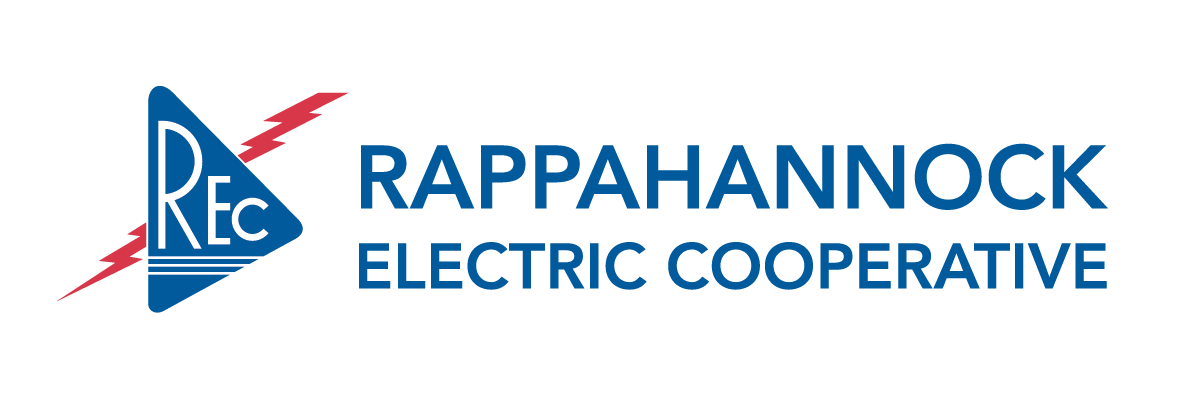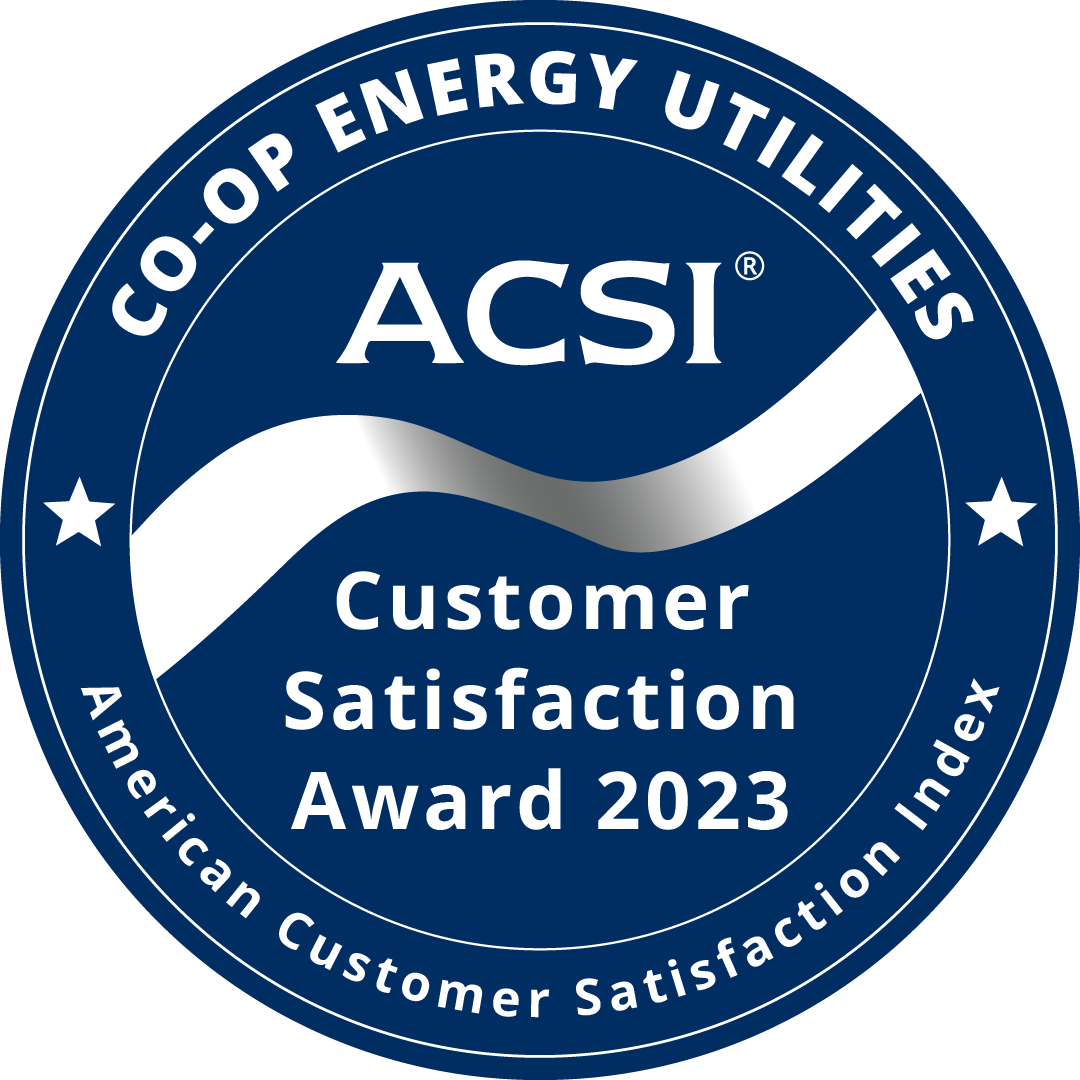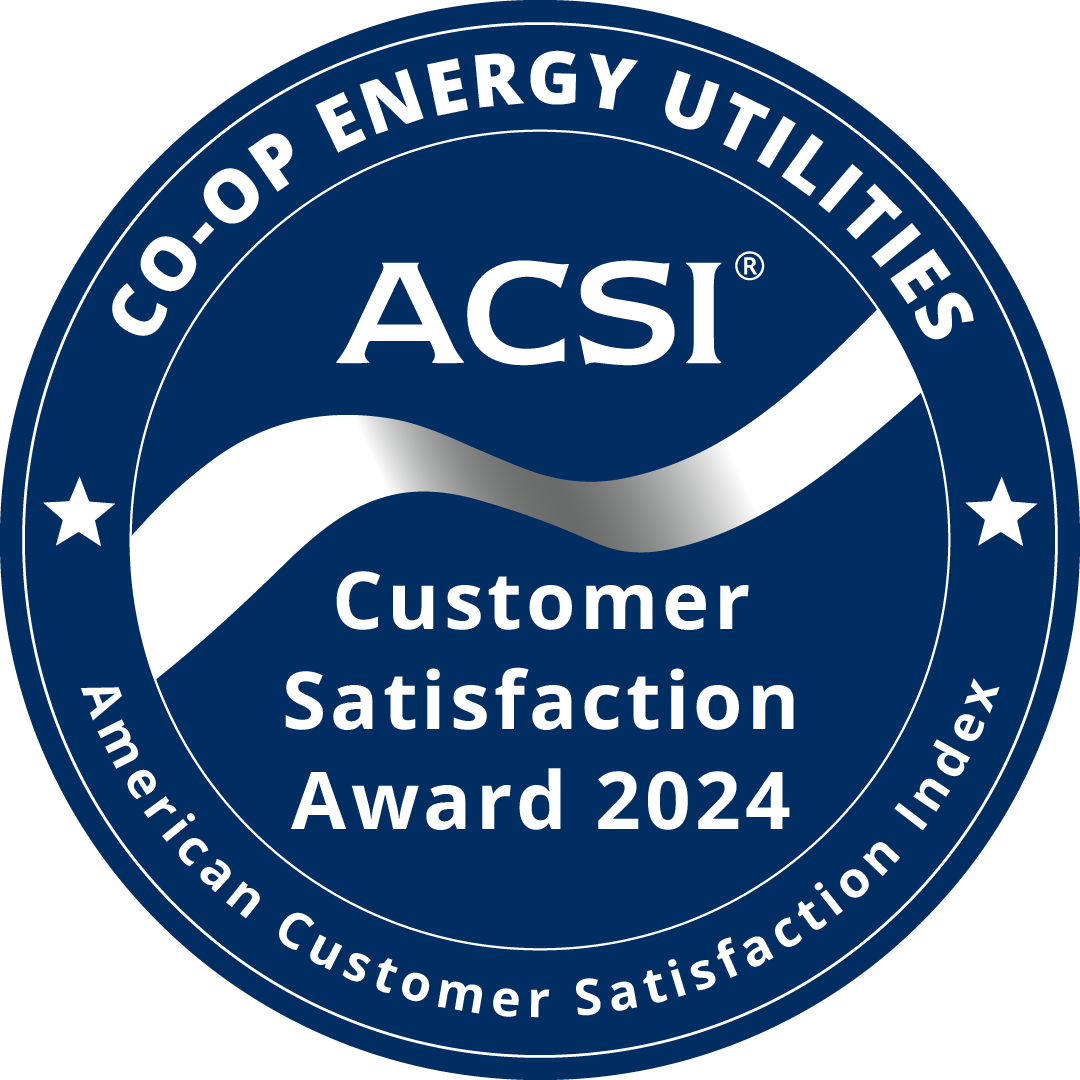What is net metering?
Members who install a renewable energy system can participate in net metering. The system first powers their home or business, and any extra energy flows back to the electric grid. A net meter tracks the energy sent back (in kWh), and members are billed only for their net energy use — the power they consume minus what they generate.
Net Metering Examples
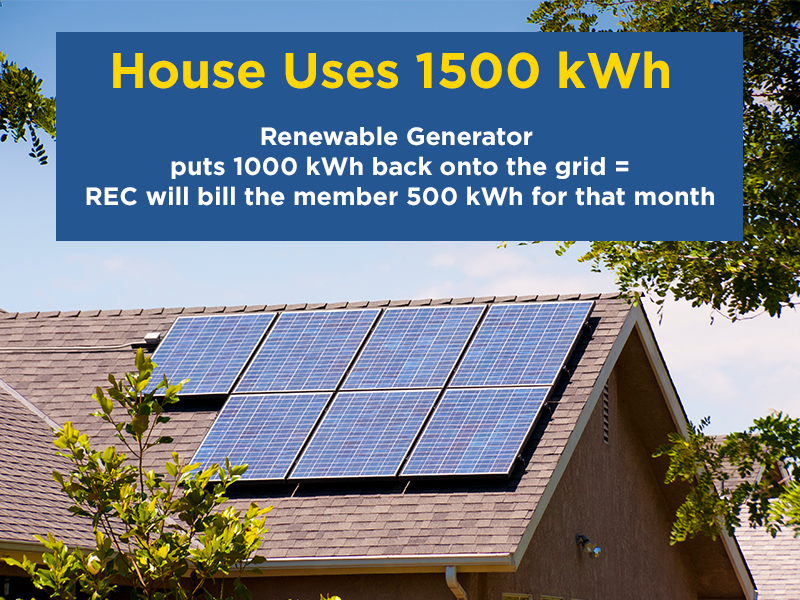
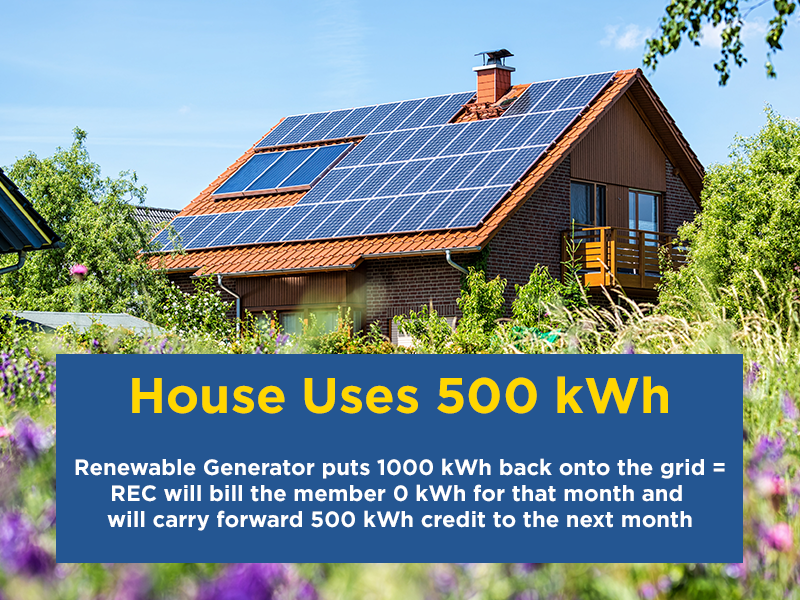
What Members Should Know
Net Metering Resources
Buying solar
Choosing to purchase your solar panels outright gives you full ownership of the system and can allow you to take advantage of federal and state incentives. You often receive the most financial benefits compared with other options as you will likely see a return on your investment within 14 – 15 years.
Getting a Power Purchase Agreement (PPA)
PPA is a voluntary agreement between a member and REC for those who qualify under Net Metering. For members who elect to enter into a PPA, REC agrees to purchase excess generation, if any, after 12 months. The value of the credits for a PPA is REC's avoided wholesale power costs or about 30-40% of the retail energy rate. Once REC pays the PPA's excess generation, the credits are set to zero. If you're considering a PPA, REC recommends that members review the PPA, which can be found here.
Getting a loan
Getting a solar loan avoids the high upfront costs and allows you to purchase the solar system over time in monthly payments. This is similar to a car loan, where you can finance the expense over time. A solar vendor will work with you to determine the terms.
Getting a solar lease
In a solar lease, you enter into a contract with a solar installer agreeing to pay a fixed monthly lease payment based on the estimated annual production of your solar system. The solar contractor that you choose will own and operate the system and gain all available incentives, tax credits and rebates.
Common Financial Incentives
When purchasing a solar project, you may be eligible for the Investment Tax Credit (ITC).
Ask the contractor about their licenses, insurance and certifications. Be sure to ask for a copy of the contractor’s license from the Virginia Department of Professional and Occupational Regulation and verify the license and contact information through the DPOR website.
It is important to find a qualified contractor that will address and support your needs for getting solar on your home or business. There are many ways to find a contractor, including asking REC members, family and friends for referrals or by searching online. REC has provided some resources below to help guide you in selecting and interacting with a contractor.
Tips and additional information
- Aim to get at least three written bids or quotes from different solar contractors so that you can receive the most competitive offer. Contractors should be willing to do free inspections and estimates including: installation cost, electricity produced from the solar panels, and net cost of the system.
- Get an idea of how much electricity you want the system to produce, or what size system you would be interested in installing. The size of the system, its access to sunlight, positioning, etc are all key factors in determining a solar system’s productivity.
- Don’t rush to sign a contract without thoroughly reviewing it. Be sure you understand the costs of the system and if they will remain constant or increase overtime.
- Research solar contractors online and see what other people are saying about them.
- Angie’s List
- Energy Sage
- Better Business Bureau
- Examine your roof
- Rooftop solar is the most common installation setup for residential and commercial solar energy developments, so assessing your roof can give you a good idea of what solar installation you can expect. South-facing roofs are best for solar, but east- and west-facing roofs also provide good opportunities.
- Be sure that your roof can withstand the weight of solar panels, along with the longevity of the system. Solar panels can last up to 25 years or more, so its important to evaluate the lifetime of your roof before going solar.
Inquire about the equipment warranties associated with your solar project. Most solar contractors will offer warranties on the equipment, so if something goes wrong it can be fixed at little or no cost to you.
Ask the contractor about maintenance of the system, so you can be sure what to expect after your project has been installed.
Inquire about timelines and milestone, its important to be informed about how long the project will take to be completed.
When a net metered system is installed, it has a manual AC disconnect device that separates the inverter from REC’s electrical grid. It is required by Virginia net metering code to be installed, and there are many different types of disconnects available. However, REC has created a guide for solar contractors to understand what qualifications AC Disconnects must have. It can be found here.
Application Process
Before you install solar panels, wind turbines, or any other distributed-energy resource, you’ll need to submit a Net Metering application in order to connect to our electric grid. Unless you plan to self-install the equipment, your contractor will submit the application on your behalf. Once approved by REC, the system can be installed, and following the inspection of your equipment, REC will install a bi-directional meter at your location.
Please note: REC does not allow any meter collars or devices that are not REC-approved to be installed on or within our meter base. Solar installers and other vendors are not authorized to install devices on REC meters or tamper with metering equipment.
Please see Virginia State code here for more information.
Steps to Participate
- Submit a net metering application via PowerClerk
- Once a completed application is received, REC will send both the member and vendor email confirmation of receipt.
- REC has 30 days to review and approve the application or send it back for corrections.
- REC will send the member and/ or solar vendor approval to install the net metered system as stated on the application.
-
Please note that the system must be approved by REC via the application process before any equipment can be installed.
- The solar vendor or member is responsible for installing the system per all applicable state, county, and electric codes.
- The net metered system must be certified by a licensed Virginia electrician and/or approved by the local inspection authority per VA Net metering code.
- Once the electrician provides certification or the inspection is completed and passed, the solar vendor or self installer must log into the PowerClerk to fill out the electrician information, and if applicable, upload proof of passed inspection.
- Once REC has received and reviewed the final signed application, we will schedule an REC technician to perform the interconnection inspection at the service address of the net metered system.
- Please review our AC disconnect guide here.
- If the project passes inspection, the net meter will be installed.
- Once the required metering and billing work is complete, a Permission To Operate (PTO) email will be sent to both the vendor and member.
- The email will contain an official PTO letter. The project status will change to "Permission to Operate,” and the system can be turned on.
Solar Sizing
Maximum net metered system sizes (AC capacity):
- Residential 20 kW
- Non residential 1000 kW or 1 MW
- In addition to these system capacity limits, a net metered system cannot be projected to produce more than 100% of a member’s most recent past 12 months of billing history, OR an annualized calculation of billing history if 12 months of billing history is not available. This is per Virginia net metering code which can be found here.
- The state of Virginia allows REC members to install net metering capacity based on REC’s peak annual load and the threshold differs between residential, non-residential, or non-jurisdictional customer classes. See below for the available NEM Capacity Available: February 2026
| NEM Capacity Available | % of capacity available | kW of capacity available |
| Residential | 10% | 3,567 |
| Nonresidential | 58% | 6,838 |
| Nonprofit & Non-jurisdictional | 81% | 19,109 |
Frequently Asked Questions
Your bill will be similar to your normal electric bill. Any amount that is billed reflects your usage from the grid (Forward Register) minus the energy your system sent back to the grid (Reverse Register). Regardless of how much energy is generated, you will always be subject to paying the fixed monthly charge. If your bill includes a kWh charge based on energy use, it means your home used more electricity from the grid than your system sent back during that billing period. If you generate more electricity than is needed for your home or business in a given month, the excess amount is carried to the next billing period as kWh credit, which reduces the number of kWh billed in the following month.
No, REC does not own or install your solar panels. Depending on the finance option you choose, you or the solar contractor you choose will be the owner of the solar panels. The solar contractor you choose will likely be the contractor (or affiliated subcontractor) responsible for installing your solar panels.
No. Your bill does not show the amount of energy your system generates. The electricity your system generates is first consumed inside your premise to power appliances, electronics, lights, etc. Only your NET excess generation - the unused generation your system provided onto the grid - shows on your bill.
In most cases, REC does not have to install equipment. However, in a few cases, system distribution improvements may be necessary for interconnection to the utility. In those cases, REC will bill the member for these improvements because the output of the system being installed exceeds the capacity of REC's installed equipment. These charges will be based on the amount of engineering time, material and construction of work necessary to complete the interconnection.
REC charges an interconnection inspection fee of $50 for Net Metering projects that are larger than 10 kW AC.
What size of a renewable generator am I allowed for Net Metering?
The state of Virginia allows installations of up to the following sizes:
Residential applications up to 20 kW Nameplate AC
Non Residential applications up to 1000 kW Nameplate AC
In each instance, the installation may not be sized to generate more than the total annual energy consumed at that location.
Can I install a renewable generator without notifying REC?
No. By law you must notify your Cooperative as to your intentions of interconnecting to REC's system.
If you are found to be operating a generator that has not been approved by the Cooperative, then your electrical service and generator may be disconnected due to the serious safety concerns to Cooperative workers and the public.
Additional resources:
U.S. Department of Energy
National Renewable Energy Laboratory - Solar Basics
Database of State Incentives for Renewable Energy
Federal Tax Credit Incentives
Solar Electric Power Association
Virginia DEQ - Renewable Energy
Virginia Dept. of Mines, Minerals and Energy - Solar Power
Solar Energy Industries Association - Virginia
Unless you install a system enabling you to completely disconnect from the energy grid, you will always receive an electric bill from REC (as long as you are an REC member-owner). REC will continue to provide electricity to your premise, which is consumed by you when/if your renewable energy system generates less than is used during the monthly billing cycle. When you have generated more electricity than you consumed during the billing period, you will receive a monthly bill that includes the access charge and any additional charges related to REC programs or services you have chosen. You will also see a credit of kWh (banked usage) which will carry forward to your next bill.
No. Due to safety reasons, if the electric service to your home is out, your net metering system will be forced offline.
This precaution is to prevent your generation system from feeding excess electricity onto the grid, which would put REC line workers at risk as they repair electrical lines.
The only way to supply power to your home with distributed generation during power outages is to install an energy storage system.
We will continue to Net Meter and transfer the Net Meter to the next owner. Until REC is advised that the system has been removed, the premise is considered a Net Metering premise.
Its important to note that unless you have entered into a PPA with REC, you will not be able to receive a payout for any existing banked kWh on your account at the time of account closure.
No, generator transfer switches are not compatible with net metering since the collar will not allow the meter to rotate in reverse.
